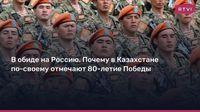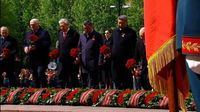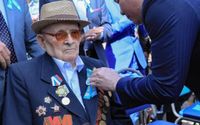In a significant display of respect and remembrance, President Kassym-Zhomart Tokayev of Kazakhstan participated in the ceremony of laying flowers at the Tomb of the Unknown Soldier in Moscow on May 9, 2025. This event coincided with the celebrations of the 80th anniversary of Victory in the Great Patriotic War, a moment that holds deep historical significance for many nations, including Kazakhstan.
Earlier that day, Tokayev greeted military personnel from the Armed Forces of Kazakhstan who were participating in the Victory Parade on Red Square. This annual event is a major occasion in Russia, drawing leaders and dignitaries from around the world, and this year was no exception. Tokayev's participation underscores Kazakhstan's commitment to honoring the sacrifices made during World War II, as well as its strong ties with Russia.
In Kazakhstan, the military parade commemorating the same anniversary was held not on May 9, but on May 7, 2025. This decision reflects Kazakhstan's unique approach to the commemoration of the end of World War II. The parade, which took place in Astana, featured over 4,000 military personnel from various branches of the armed forces and showcased more than 200 units of military equipment, including 66 aircraft and helicopters. This year marked the fifth such parade in the capital since the country gained independence.
During the parade, which was attended by Tokayev, he emphasized the importance of remembering the sacrifices made by Kazakh soldiers during the war. He stated, "We honor the feats of our ancestors who heroically defended their homeland and cherish the bright memory of those who fell in battles for the Fatherland." This sentiment resonates with many Kazakhs, as approximately 75% of the population views Victory Day as a significant event, both personally and nationally.
The choice of May 7 for Kazakhstan's parade is historically rooted. It aligns with the establishment of the Ministry of Defense of Kazakhstan, which was formed on May 7, 1992. This date is also celebrated as Defender's Day, similar to Russia's February 23. According to political analyst Daniyar Ashimbaev, this timing was strategic, allowing Kazakhstan to honor its own military history while participating in broader commemorative efforts with Russia.
Despite the historical ties and shared memories, there are nuances in how Kazakhstan observes these commemorations. The country has its own traditions and practices that reflect its national identity. For instance, this year, Kazakhstan decided to name around 500 streets after Kazakh soldiers to honor their contributions during the war. Additionally, all surviving veterans of the Great Patriotic War received a financial gift of 5 million tenge (approximately $9,500) in recognition of their service.
As the celebrations unfolded, discussions about historical memory and identity came to the forefront. Some Kazakhs express a desire for a more nuanced understanding of their role in the war, advocating for a recognition of the contributions of all Soviet republics. This perspective has been fueled by ongoing debates about the significance of Victory Day and how it is remembered in Kazakhstan.
In recent years, there has been a growing discourse around the symbols associated with the war, particularly the St. George ribbon, which some view as emblematic of Russian propaganda. In Kazakhstan, a distinct ribbon in the colors of the national flag has emerged as a symbol of local remembrance, reflecting the country’s desire to assert its own narrative while still honoring shared history.
Amid these discussions, the event known as "Batyrlarǵa Taǵzym" (Bow to the Heroes) has gained traction in Kazakhstan. This event, which honors Kazakh front-line soldiers, will take place in two cities this year—Almaty and Semey. Tokayev has voiced strong support for this initiative, stating, "It is crucial to convey the truth about the war to all citizens of our state. Without truth, it is impossible to understand the value of peace. Distortion of historical truth about the war and the significance of the Great Victory is unacceptable."
As Kazakhstan navigates its relationship with its past, the government has planned over 2,000 events and activities across the country to mark the 80th anniversary of Victory in the Great Patriotic War. These initiatives reflect a commitment to preserving the memory of those who fought and died, while also fostering a sense of national pride.
In conclusion, the commemorations of the 80th anniversary of Victory in the Great Patriotic War highlight the complexities of historical memory in Kazakhstan. While the nation honors its contributions to the war effort, it also seeks to carve out a distinct identity that acknowledges its unique history and the diverse narratives that shape its present.






